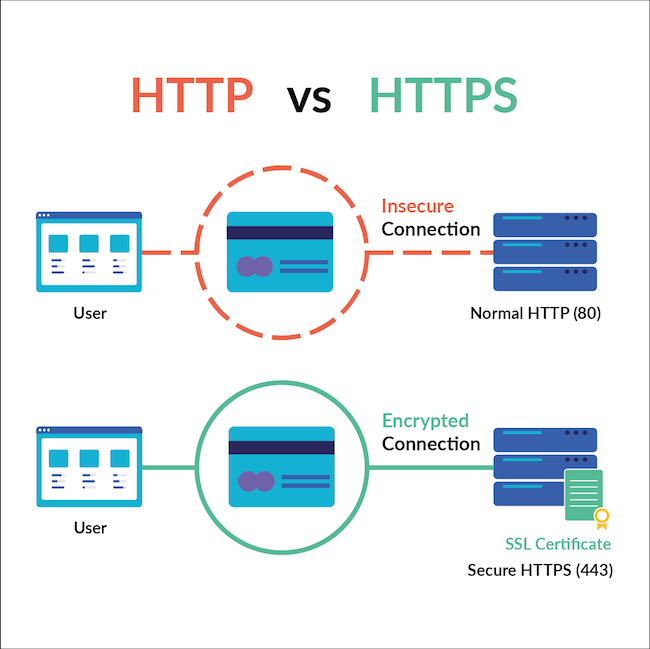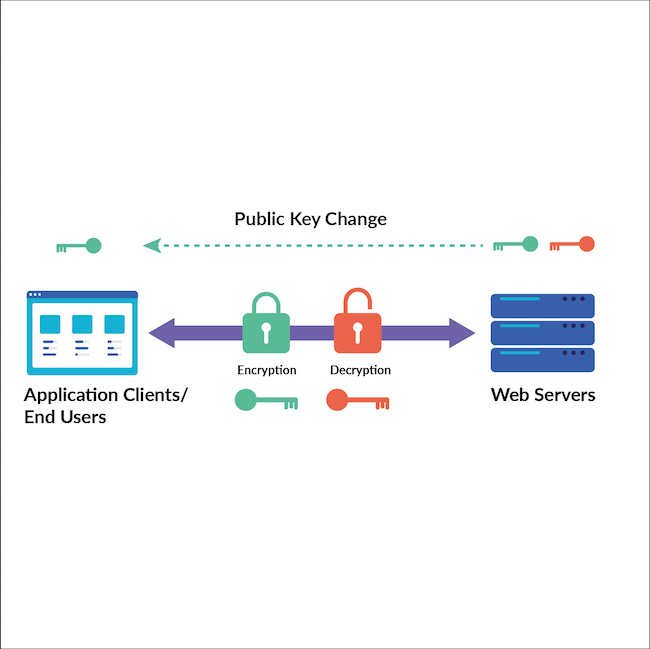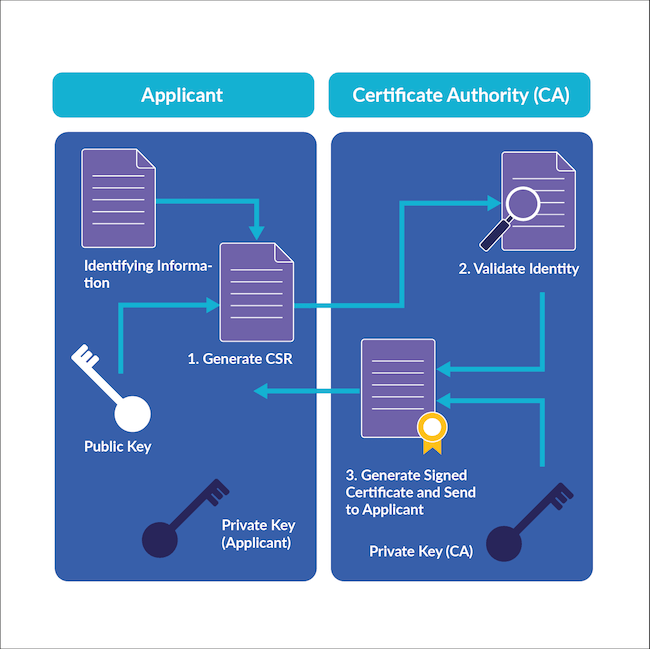What Is an SSL Certificate? Exploring the Foundation of Digital Security
Our independent research projects and impartial reviews are funded in part by affiliate commissions, at no extra cost to our readers. Learn more
As you may know, the addresses you use to access websites are known as URLs (Uniform Resource Locators). For example, Google’s URL is:
https://google.com
But did you ever notice that some URLs start with http://, while others begin with https://? It’s obvious that the difference between these two types of URLs is the letter S. But what’s not so obvious is what that extra S means, exactly.
Simply put, the S signifies security. That’s not to say that the S officially stands for security, but it does mean that the website you’re browsing has an additional layer of encryption.
What’s more, it also signifies that the website is safer to use and share any sensitive information with, such as credit card details.
Whether you’ve built your site with a Content Management System (CMS), or one of the top website builders on the market – and whether you’re starting a blog, building a website, or creating an online store – you need to consider what this security and encryption technology can offer you and your site’s visitors. If you do decide to go for it, you’ll need to invest in something called an SSL certificate – read on to learn more!
What is an SSL Certificate?
SSL stands for Secure Sockets Layer, a type of security technology. It’s used to cryptographically build a secure, encrypted connection between a web server and your browser. Think of it as a private communication line, like the ones secret agents use in spy movies to send coded messages.

An SSL certificate is essentially a small data file associated with a website. When you try to access the website, your web browser requests the contents of the website from a web server. When that happens, the SSL certificate authenticates the identity of the website, and ensures that whatever data you send to the server remains private.
How Does an SSL Certificate Work?
SSL technology makes use of a concept known as Public Key Cryptography, which utilizes two long strings of random numbers called ‘keys’. One serves as a private key, while the other is public.
The public key is available in the public domain, and can be leveraged to encrypt any data. However, the public key cannot decrypt the data.
This is where the private key comes into play. Only the private key can unlock the message that was encrypted using its public counterpart.

For example, if a user sends you a message through a form on your website, your public key will turn the message into a secret code. Since you (i.e. your web server) are the only one with access to the private key, only you can decipher and read this message. If a hacker tries to steal the message when it’s on its way to the server, all they will get is the secret, cryptographic code, not the actual message.
For a comprehensive rundown of how a website security certificate works, we’ve broken down each step in the process of SSL authentication and encryption:
- Client initiates connection: the process begins when the client (usually a web browser) sends a request to establish a secure connection to a server. This is typically done by entering a secure URL (https://) or clicking on a secure link.
- Server presents SSL certificate: in response to the client’s request, the server sends its SSL certificate. The certificate contains the server’s public key, along with other information: such as the domain name and the certificate’s validity period. The server’s public key encrypts this key information, and establishes a secure connection.
- Client verifies the SSL certificate: the client’s web browser or application verifies the authenticity of the SSL certificate – checking the certificate’s digital signature to ensure that it’s been issued by a trusted Certificate Authority (CA) and that it hasn’t been tampered with or expired. The browser also checks if the domain name on the certificate matches that of the website.
- Encryption of data transmission begins: once the client has verified the SSL certificate and established trust, it generates a session key. The session key is a unique symmetric encryption key used for encrypting the data transmission between the client and the server. The session key is then encrypted using the server’s public key from the SSL certificate and sent to the server.
- Encryption of data transmission: with the session key exchanged, the client and server can now communicate securely. They use the session key to encrypt and decrypt the data transmitted between them. This encryption ensures that any data exchanged during the session remains confidential and protected from eavesdropping or unauthorized alteration.
Simple!
Why Does my Website Need an SSL Certificate?
As we mentioned earlier, an SSL certificate replaces your HTTP web address with HTTPS. This change lets users know that you’re using SSL technology, and helps them feel more confident about sharing sensitive information, such as credit card details.
This major trust signal plays a large part in why 85% of users worldwide do not trust websites without an SSL certificate. Plus, the absence of an SSL certificate will lead to a “not secure” warning from most modern web browsers. As a result, your visitors will be less likely to proceed to your site – let alone sign up, enquire about your services, or buy what you’re selling!
Another component to ensure your site appears trustworthy to visitors is having a privacy policy. You can find out how to write a privacy policy in our guide.
Find Out More
Installing and verifying an SSL certificate is the very first step in our Website Security Checklist. For more steps to follow, such as running regular updates, and backing up and scanning your site, check out the full guide.
Types of SSL Certificates
SSL certificates can be classified based on two factors: the number of domains owned, and the level of validation required.
In terms of the number of domains or subdomains owned, an SSL certificate can be:
- Single: Securing one fully-qualified domain or subdomain
- Wildcard: Covering one domain name and its multiple subdomains
- Multi-Domain: Securing multiple domain names
Regarding the level of validation needed, an SSL certificate can be based on:
Domain Validation
Domain validation comes with basic encryption and verification of your site’s domain ownership. Obtaining this kind of SSL certificate typically takes anything from a few minutes to a couple of hours.
Organization Validation
Organization validation covers everything involved in domain validation, in addition to authenticating certain information about the owner (such as name and address). Securing this type of SSL certificate usually takes anything from a few hours to a couple of days.
Extended Validation
Extended validation provides the highest degree of security. In addition to domain name ownership and owner authentication, it verifies the legal, operational, and physical existence of the entity. Netting this variety of SSL certificate involves a thorough investigation of the entity according to the guidelines formed by the SSL certification industry’s governing consortium, and typically takes anything from a few days to a couple of weeks.
The cost of your SSL certificate will depend on the type you choose.
Benefits of SSL Certificates
So, how can having a SSL certificate on your website benefit your business?
The list is long, and includes – but is by no means limited to – these drawcards:
- Enhanced data security and encryption: SSL certificates encrypt data transmitted between the client and server – making sure that it can’t be intercepted or accessed by the wrong people. This protects sensitive information, like passwords, credit card details, and personal data, from falling into malicious hands.
- Protection against data interception and tampering: Data breaches happen, but SSL certificates provide protection against man-in-the-middle attacks by verifying the authenticity of the server – and ensuring the integrity of the transmitted data. This prevents hackers from intercepting communications, or messing with the information exchanged.
- Increased user trust and confidence: when a website has an SSL certificate, it displays a padlock symbol and “https://” in the address bar, indicating a secure connection. This instills trust in users – reassuring them that their data is being transmitted securely. It also helps to prevent warnings or error messages that may deter visitors from accessing your website.
- Improved search engine ranking and SEO impact: for search engines like Google, SSL is a ranking factor. That means websites with SSL certificates are more likely to rank higher in search results compared to those without SSL. Which, in turn, means that having an SSL certificate on your website will positively impact its visibility, organic traffic, and overall SEO efforts. It’s an easy SEO basic to check off!
Where Can I Get an SSL Certificate?
Certificate Authorities (CAs) are the organizations responsible for accepting and reviewing SSL certificate requests from different entities. For each request, these CAs issue an SSL certificate only once they have verified the identity and legitimacy of an entity.

However, most of the popular domain registrars and website hosts these days give you the option to purchase an SSL certificate as part of a bundle with your domain name or hosting plan. They may also have unique instructions on how to install and activate your purchased SSL certificate.
Further information:
- Read our guide on how to get an SSL certificate for more information
- Learn how to protect yourself by learning about ecommerce fraud prevention
Best Practices for SSL Certificate Usage
Of course, it’s not enough simply to have an SSL certificate on your website. You need to be updating, optimizing, monitoring, and managing it – to get the most out out of everything your SSL certificate has to offer.
With that in mind, some best practices for SSL certificate usage include:
- Regularly updating and renewing your SSL certificate: SSL certificates have expiration dates, and you’ll need to renew yours before it expires. Checking and updating your SSL certificate often helps you avoid disruptions to your service – and ensure your certificate continues to provide secure communication.
- Implementing strong encryption algorithms and protocols: to ensure the highest level of security, you’ll need to use strong encryption algorithms and protocols. This involves utilizing the latest industry standards – such as TLS 1.3 – and harnessing strong cipher suites to protect data during transmission.
- Avoiding mixed content and insecure elements on websites: to maintain the security and integrity of your website’s SSL connection, be sure to avoid mixing secure (HTTPS) and insecure (HTTP) content on a website. All elements, including images, scripts, and stylesheets, should load securely to prevent Google-generated security warnings or vulnerabilities.
- Monitoring and managing SSL certificate expiry dates: it’s vital to keep track of when your SSL certificate expires – so be sure to keep an eye on its expiration date, and set up a reminder or alert in your calendar for then. If you don’t renew your website’s SSL certificate on time, it could result in security warnings – or the loss of secure communication altogether.
Find Out More
- Following these best practices can help avoid SSL errors. However, if you do experience Problems With Your Website Security Certificate, our guide can help you identify and fix them!
FAQs
- Check if the URL says “https://” or “http://” (The secure option is https://)
- See if there’s a padlock icon in the browser address bar – if there is, it’s SSL-equipped!
- Use an online SSL checker tool
An SSL certificate verifies the authenticity of the server, encrypts data transmission, and establishes a secure connection. This ensures that the sensitive information bouncing around between the client and the server – such as personal data or financial details – remains confidential. And safeguarded from unauthorized access or interception by malicious entities.
Automated certificates can be obtained quickly, while extended validation certificates may take longer because of the extra verification steps involved.
However, with modern hardware and optimized SSL implementations, the impact is minimal – and, usually, negligible. The benefits of SSL – which, as we’ve seen, include improved security, trustworthiness, and SEO rankings – outweigh any potential performance impact. So go secure your SSL certificate today!
Leave a comment